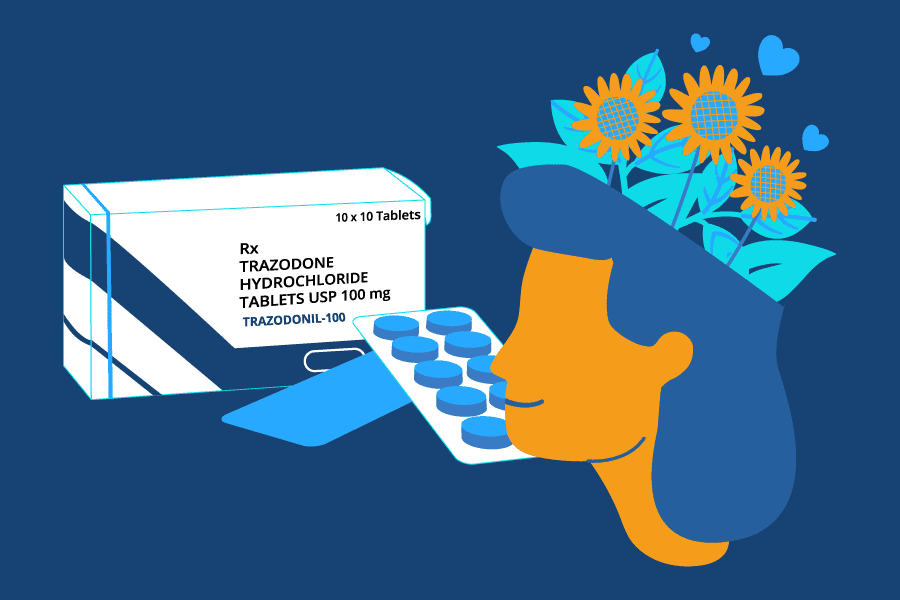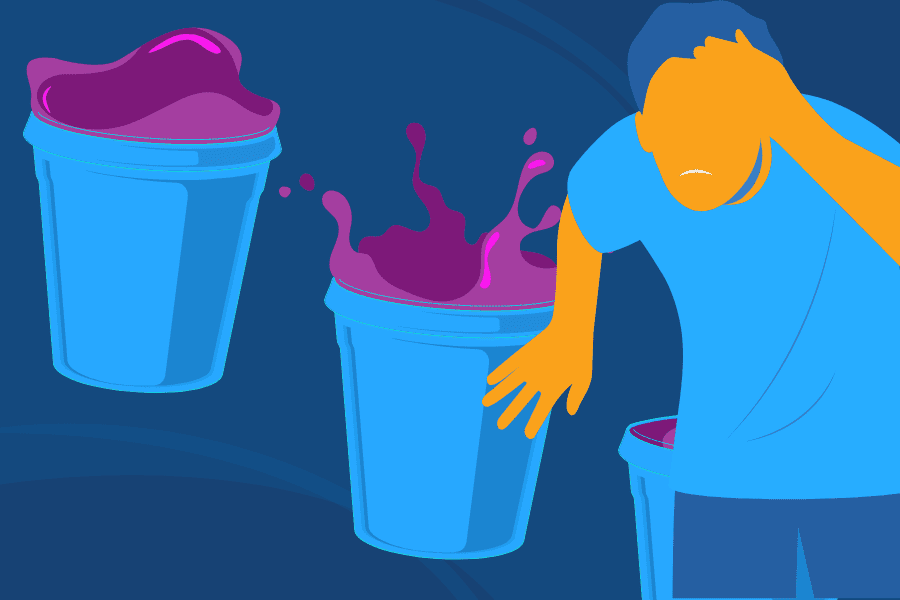Trazodone Overview
What Is Trazodone?
Trazodone is an antidepressant used to treat major depressive disorder.
Sometimes, it is used as an off-label treatment for other conditions, such as insomnia, schizophrenia, and anxiety.
Trazodone belongs to a class of medications called serotonin modulators, which means they work by altering the activity of post-synaptic serotonin receptors and by inhibiting the re-uptake of serotonin.
While trazodone is not considered a highly addictive prescription medication, it still has a potential for misuse and dependence.
Individuals who abuse trazodone or who are prescribed it should be aware of its effects and seek professional advice.
What Is Trazodone Mainly Used For?
Trazodone is mainly used to treat depression.
However, it is also sometimes used to treat anxiety, insomnia, and schizophrenia.
What Is the Brand Name For Trazodone?
Brand names for trazodone include:
- Desyrel
- Oleptro
- Trialodine
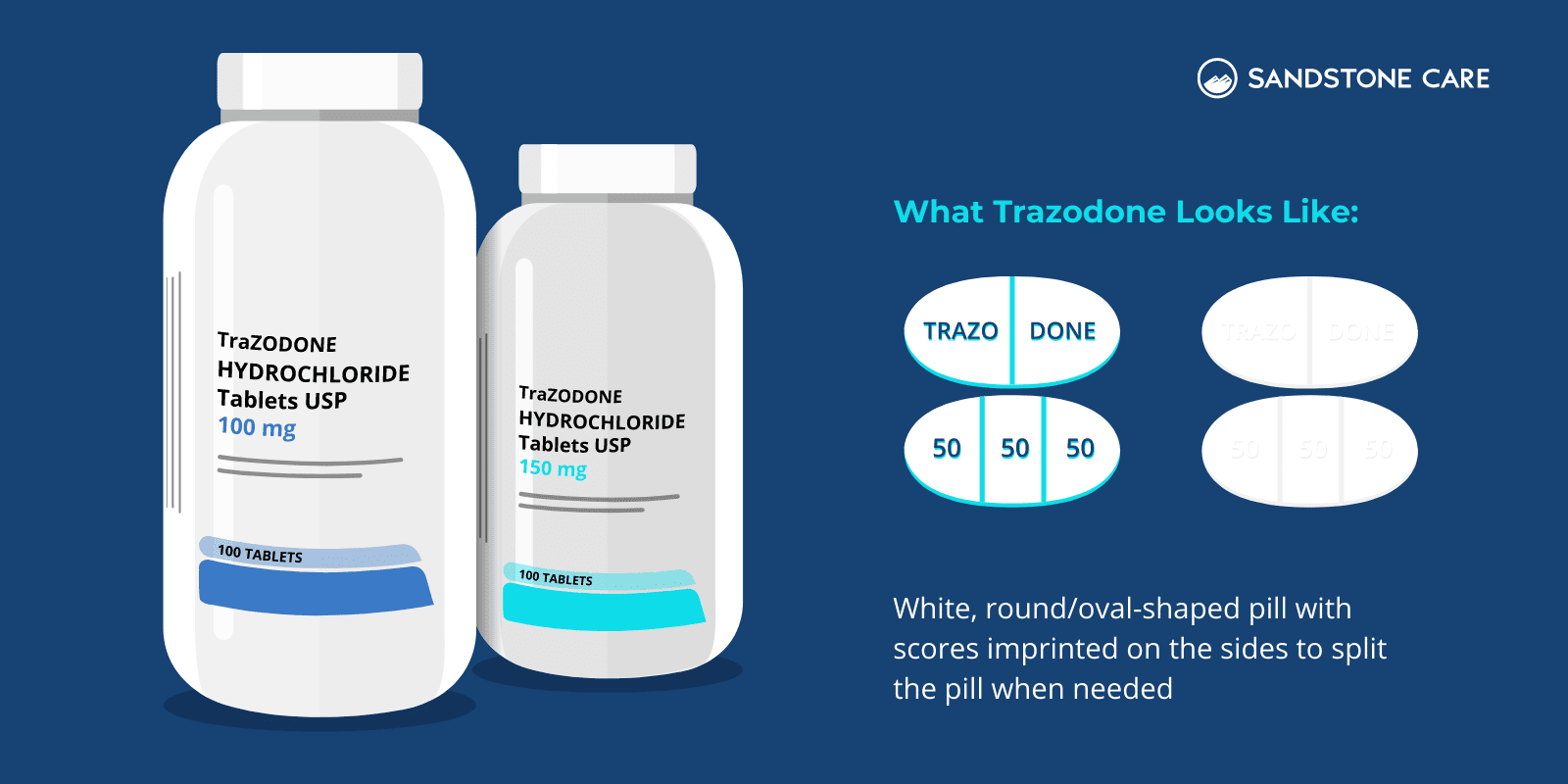
Is Trazodone Addictive?
It can be. Trazodone is not considered to be a highly-addictive medication, but there is still potential for misuse and dependence.
A study done by Psychopharmacology discussed the abuse potential for three different drugs, including trazodone, Ambien, and Halcion.
Findings suggest that trazodone is less addictive than the other two drugs in the study, yet it is still misused and can cause physical dependence, especially when used for a long period.
According to Substance Abuse and Rehabilitation, most cases of antidepressant abuse occur in individuals with other substance use and mood disorders.
While most people do not experience cravings or the compulsive behaviors often associated with addiction, abruptly stopping trazodone can lead to withdrawal symptoms such as anxiety, irritability, and sleep disturbances.
Misusing trazodone, such as taking higher doses than prescribed or using it for its sedative effects without medical guidance, can increase the risk of developing psychological dependence.
This is why it’s important to use trazodone only under a doctor’s supervision and follow the prescribed dosage.
Is Trazodone an Opioid or an Opiate?
No, trazodone is not an opioid or an opiate. Trazodone is an antidepressant that belongs to a class of medications called serotonin modulators.
It works by affecting the balance of serotonin in the brain, which helps regulate mood, sleep, and anxiety.
While trazodone is sometimes prescribed to help with sleep or anxiety, it does not have the same properties or risks as opioids, which are typically used for pain relief and have a high potential for addiction.
What Class of Drug Is Trazodone?
Trazodone is a serotonin modulator, or in the serotonin-antagonist-and-reuptake-inhibitor (SARI) class of medications.
Serotonin is a neurotransmitter that plays an important function in mood stabilization. When a person’s serotonin levels are low, it can contribute to depression and other mental health disorders.
Serotonin modulators, like trazodone, work by targeting certain serotonin receptors, including the 5-HT2A receptor.
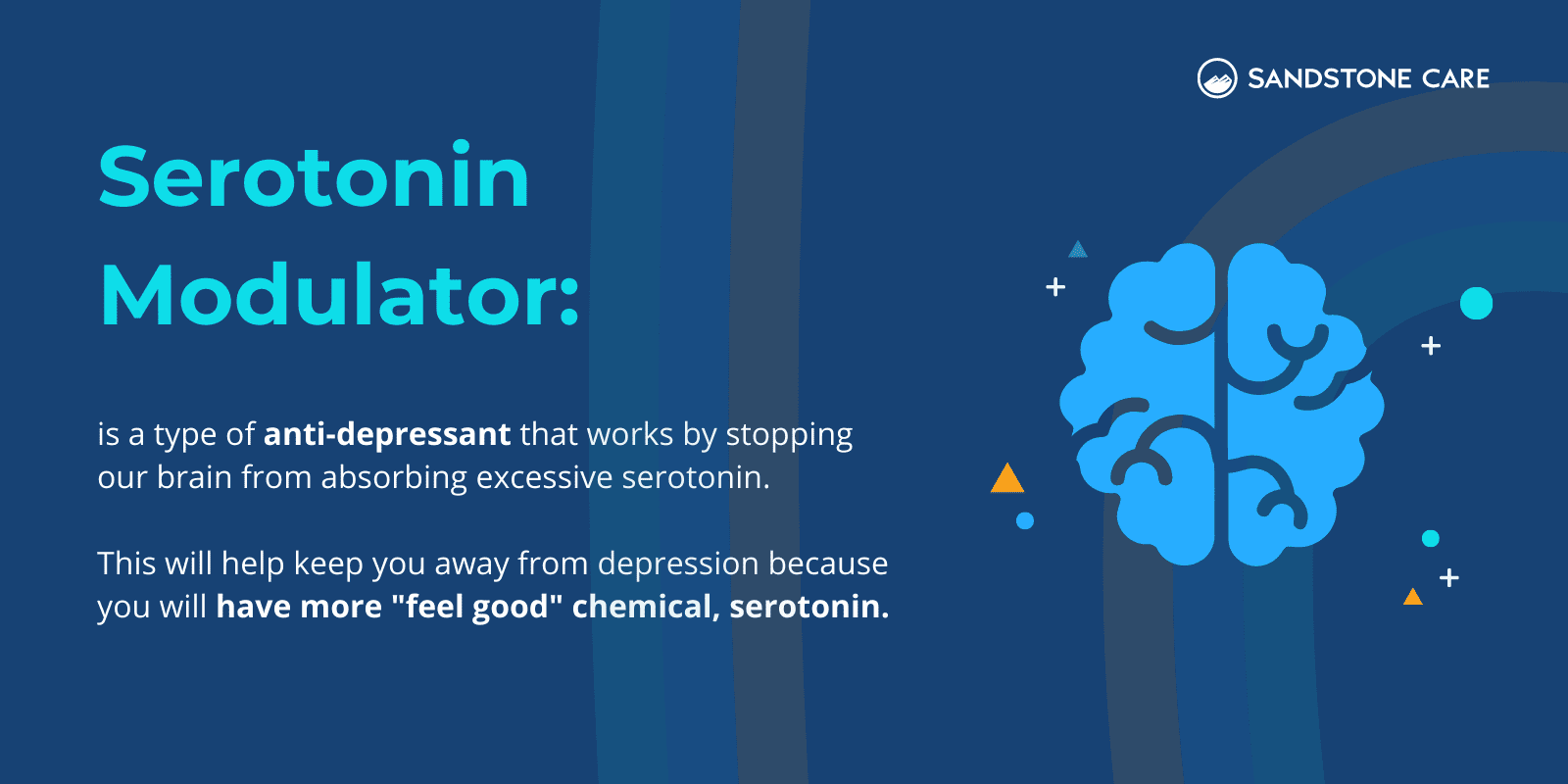
What Does Trazodone Look Like?
Trazodone is usually white and round or oval-shaped.
It also has scores imprinted on the sides that may be used to break the tablet in half to split the medication into two doses if recommended by your doctor.
Trazodone Uses
How Do You Take Trazodone?
Trazodone comes as a tablet that should be taken by mouth.
It is usually recommended to take trazodone with a meal or snack two or more times a day.
The tablets are either taken whole or broken in half where indented and taken.
If prescribed, it is important to follow your doctor’s orders carefully, along with any directions on your prescription label.
You should never take more or less than what is prescribed without consulting with your doctor.
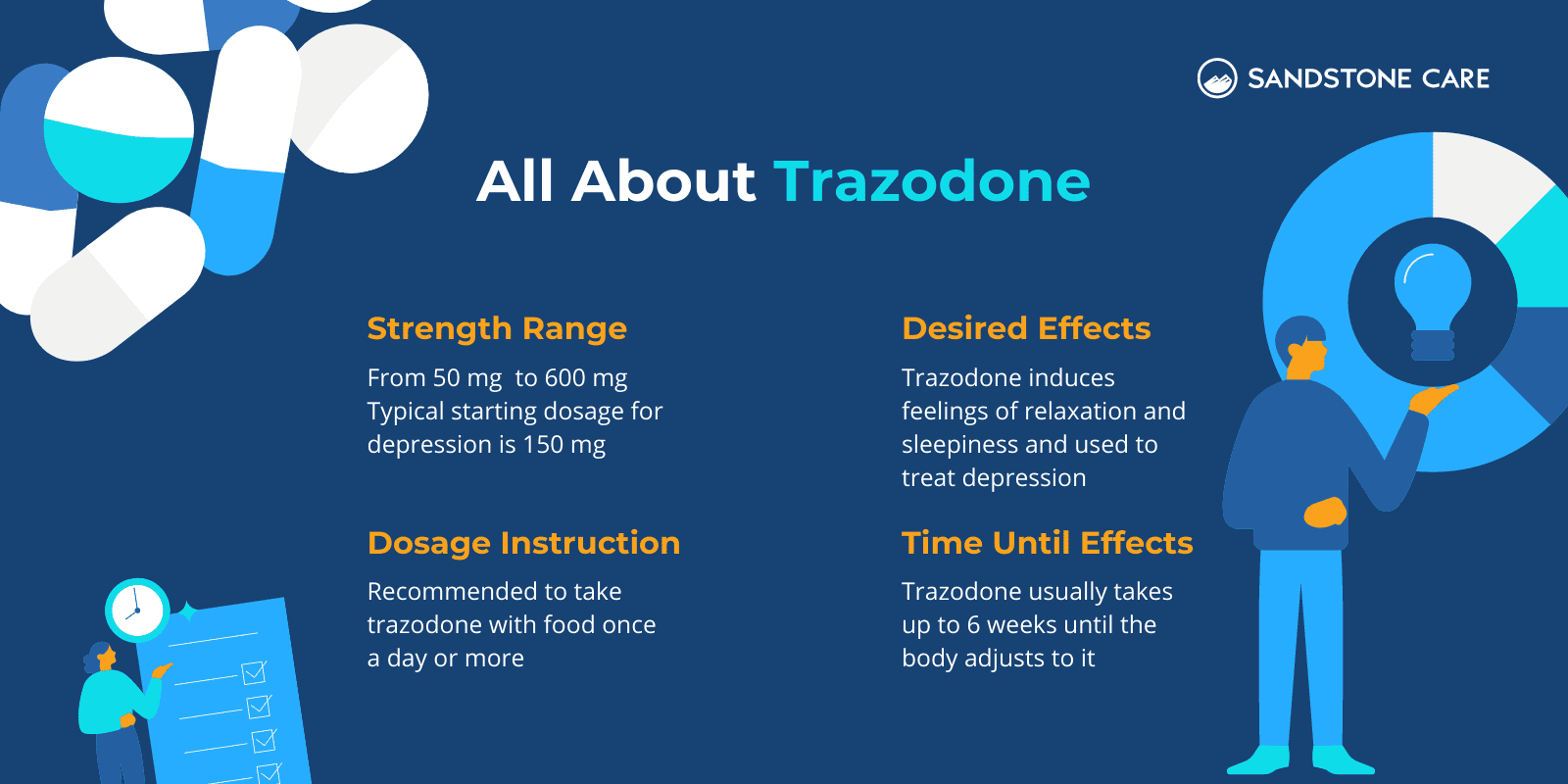
How Does Trazodone Make You Feel?
Most people who have been prescribed trazodone report feelings of relaxation and sleepiness.
It can also help people improve their mood and manage the symptoms of depression.
Some people may abuse trazodone for its sedative effects and to achieve a “high.”
While it may not produce a sense of euphoria similar to other drugs like marijuana, it can make a person feel extremely relaxed and drowsy, and some people find pleasure in it.
Recreational trazodone use does happen, and it is important to note that it is never safe to take a prescription medication without the guidance of a medical professional.
Additionally, when first taking trazodone, a person may feel that their symptoms of depression or anxiety are worsening.
This can be because the body is adjusting to new chemical levels and changes. However, it is important to let your doctor know if you are experiencing adverse side effects.
Is Trazodone Habit-Forming?
Trazodone is not known to be habit-forming. However, it should only be taken as prescribed to avoid misuse and potentially dangerous adverse effects.
Stopping suddenly can also cause withdrawal effects in some patients, so it is also important to communicate with medical providers on the best way to slow or stop using trazodone.
Is Trazodone Good To Take Every Night?
It is not uncommon for trazodone to be prescribed daily and to be taken in the evening.
However, if a person is taking more than the prescribed amount of trazodone, taking it every night can be extremely harmful, increase the risk of overdose, and have serious negative effects on their physical and mental health.
How Long Does It Take For Trazodone To Work?
Depending on what it is prescribed for, it can take a couple of weeks for trazodone to start to work at stabilizing emotional challenges.
For sleep issues, trazodone’s sedative effects are usually felt quickly, often within the first night of taking it.
However, for conditions like depression, it may take consistent daily use over a few weeks for the mood-improving benefits to fully appear.
For those prescribed trazodone for mental health issues, it is crucial to continue taking the medication even if they do not feel the improvements to their mood right away.
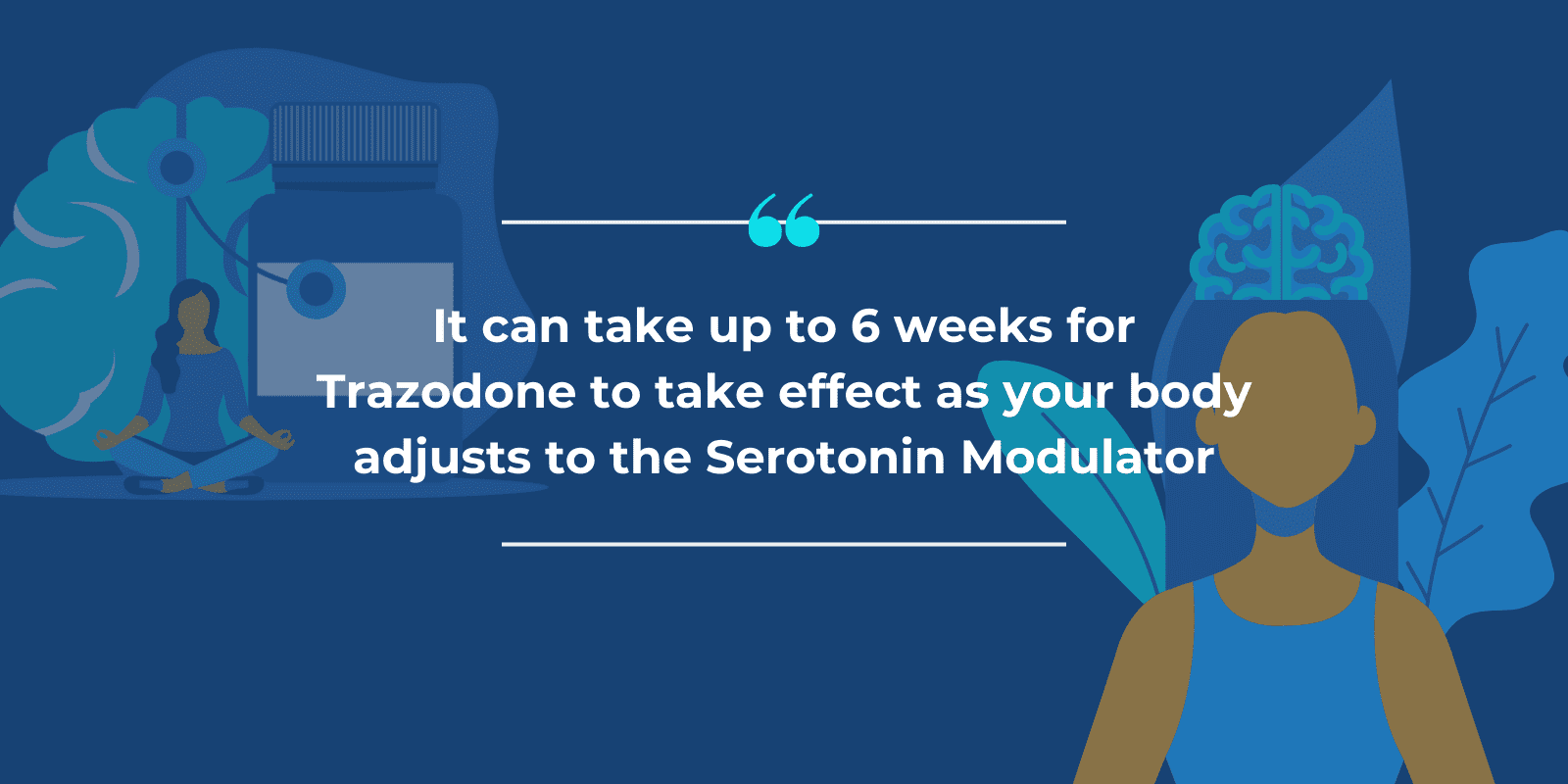
Can You Take Trazodone For Sleep and Anxiety?
Trazodone is sometimes used as an off-label treatment for sleep and anxiety.
Many people with anxiety or depression experience sleep disturbances, and trazodone can be effective in improving sleep quality by helping them fall asleep and stay asleep.
Who Should Avoid Trazodone?
It is always important to let your healthcare provider know any current medications or supplements you are taking, along with any medical history or conditions you may have before starting trazodone.
If you are planning to become pregnant, are pregnant, or are breastfeeding, consult with your healthcare provider about the safety of taking trazodone.
Trazodone also contains a boxed warning of an increased risk of suicidal thoughts and behaviors in pediatric patients.
It should also be used carefully with elderly individuals as it may increase the risk of hyponatremia, which refers to a low sodium level in the blood.
Additionally, individuals with kidney failure or liver failure should use trazodone with caution and talk to their doctors about risks and safety.
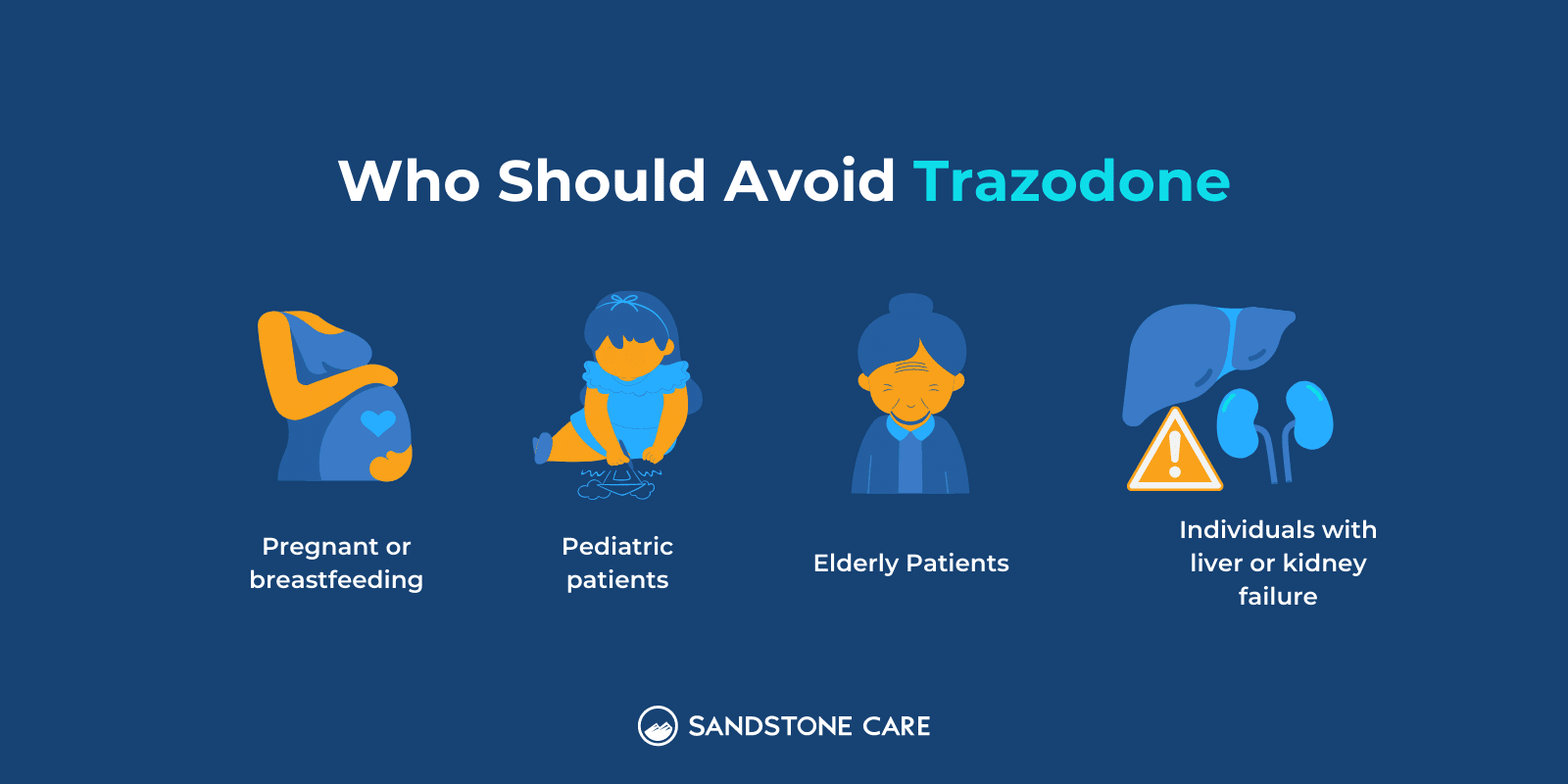
Trazodone Dosage & Interactions
What Is the Typical Dosage of Trazodone?
When used for depression, the typical dosage of trazodone is 150 mg.
Dosages for trazodone can range from a low dose of 50 mg to 600 mg for hospitalized patients.
Dosages typically start at 150 mg and may be increased in 50 mg increments depending on the individual’s response to the medication.
How Often Should You Take Trazodone?
Trazodone is usually taken as a single dose per day.
Sometimes, a doctor may recommend a person split it in half and take it twice a day.
You should only take trazodone as it is prescribed to you, no more and no less, and if you plan on making any changes to your medication or plan on stopping use, consult with your doctor first.
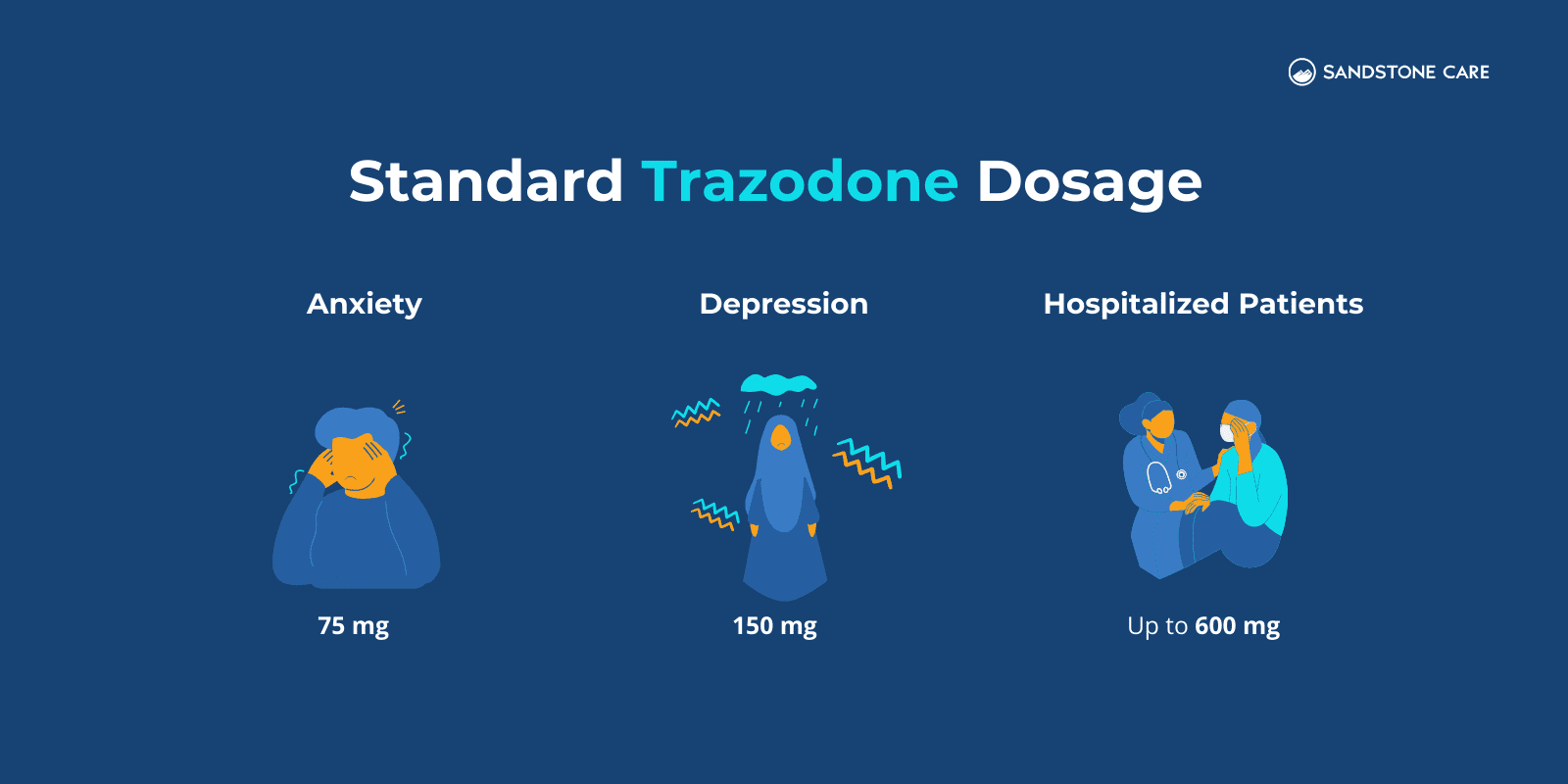
Is 50mg Of Trazodone a Lot?
50 mg of trazodone is not considered a lot; it is usually the starting dose.
Trazodone is available in 25 mg, 50 mg, 100 mg, and 300 mg oral tablets.
However, taking any dose of a medication when it is not prescribed can be very dangerous and result in harm to both the brain and body.
Can I Drink Alcohol with Trazodone?
No. Alcohol can increase the sedative effects of trazodone, and mixing the two can become dangerous.
Mixing alcohol with antidepressants like trazodone can not only make a person extremely drowsy but also make a person feel more depressed or anxious.
Individuals who misuse trazodone often do so by combining it with other substances. Mixing substances like trazodone and alcohol can increase a person’s risk of overdose and result in serious consequences.
Trazodone and alcoholism can combine to create a catastrophic cycle.
Alcohol can reduce the effectiveness of trazodone in treating depression and anxiety, while trazodone can intensify alcohol’s effects, leading to impaired judgment, confusion, or even dangerous respiratory depression.
When trazodone is made less effective through drinking, it can sometimes cause people to drink more or take higher than the prescribed dose of trazodone in an attempt to self-medicate for their depression.
Are There Interactions Between Lexapro and Trazodone?
Yes. Taking escitalopram together with trazodone is usually not advised as it may cause adverse side effects and put a person at higher risk of serotonin syndrome.
Lexapro, or escitalopram, is another antidepressant medication used to treat depression and generalized anxiety disorder.
It is important to let your doctor know if you are already taking Lexapro or any other antidepressants so that you can reduce the risk of negative and potentially dangerous side effects.
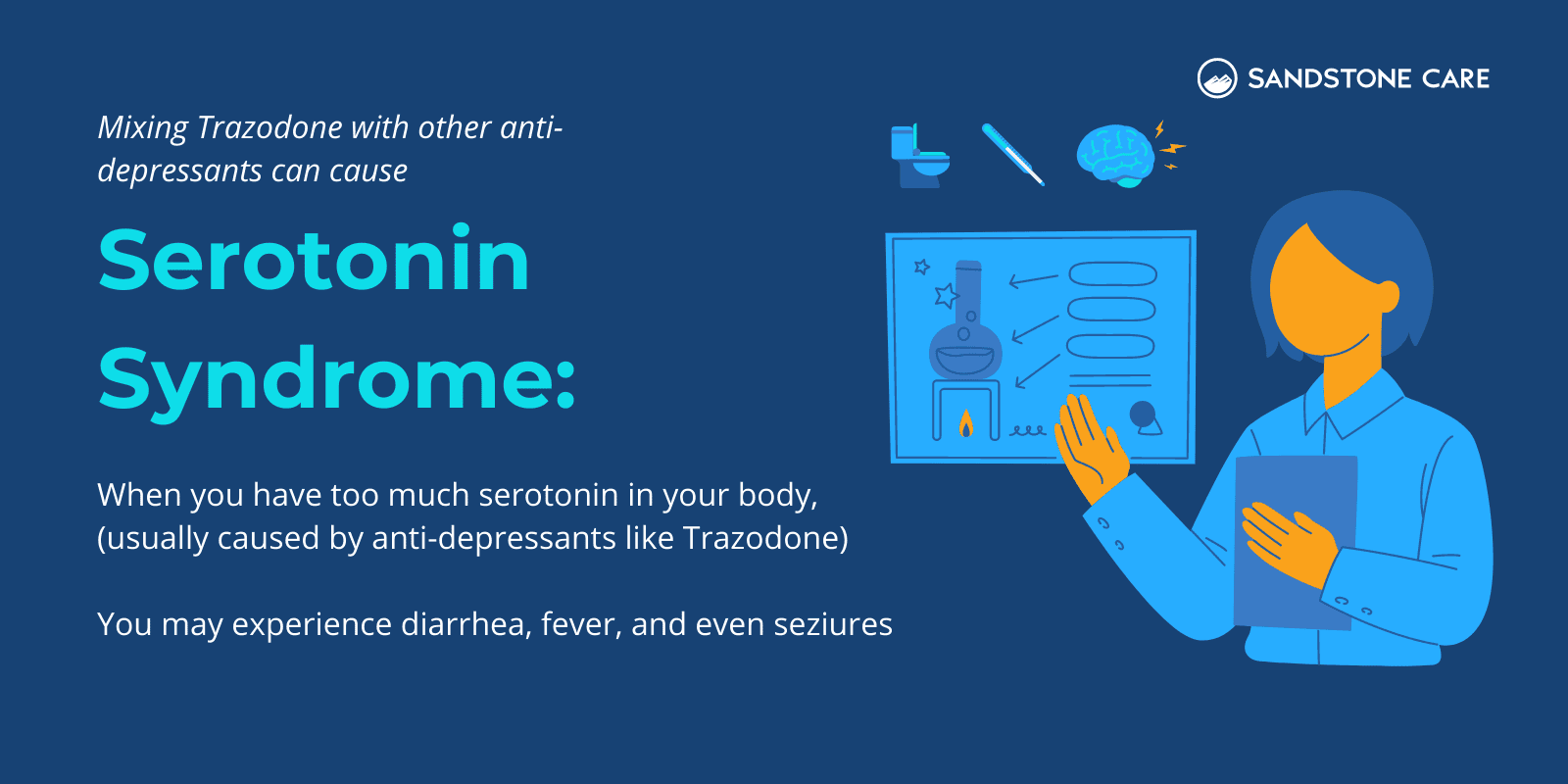
What Should You Not Take With Trazodone?
It is important to let your doctor know of any prescription medications and non-prescription medications you are taking, including vitamins and herbal supplements, before starting trazodone.
Herbal products and nutritional supplements that are especially important to mention include St. John’s Wort and tryptophan.
You should let your healthcare provider know if you are taking monoamine oxidase inhibitors (MAOIs) like tranylcypromine or isocarboxazid, as your doctor may typically recommend not taking the medications together.
Taking MAO inhibitors and trazodone together can greatly affect a person’s serotonin levels and cause a spike in a person’s blood pressure.
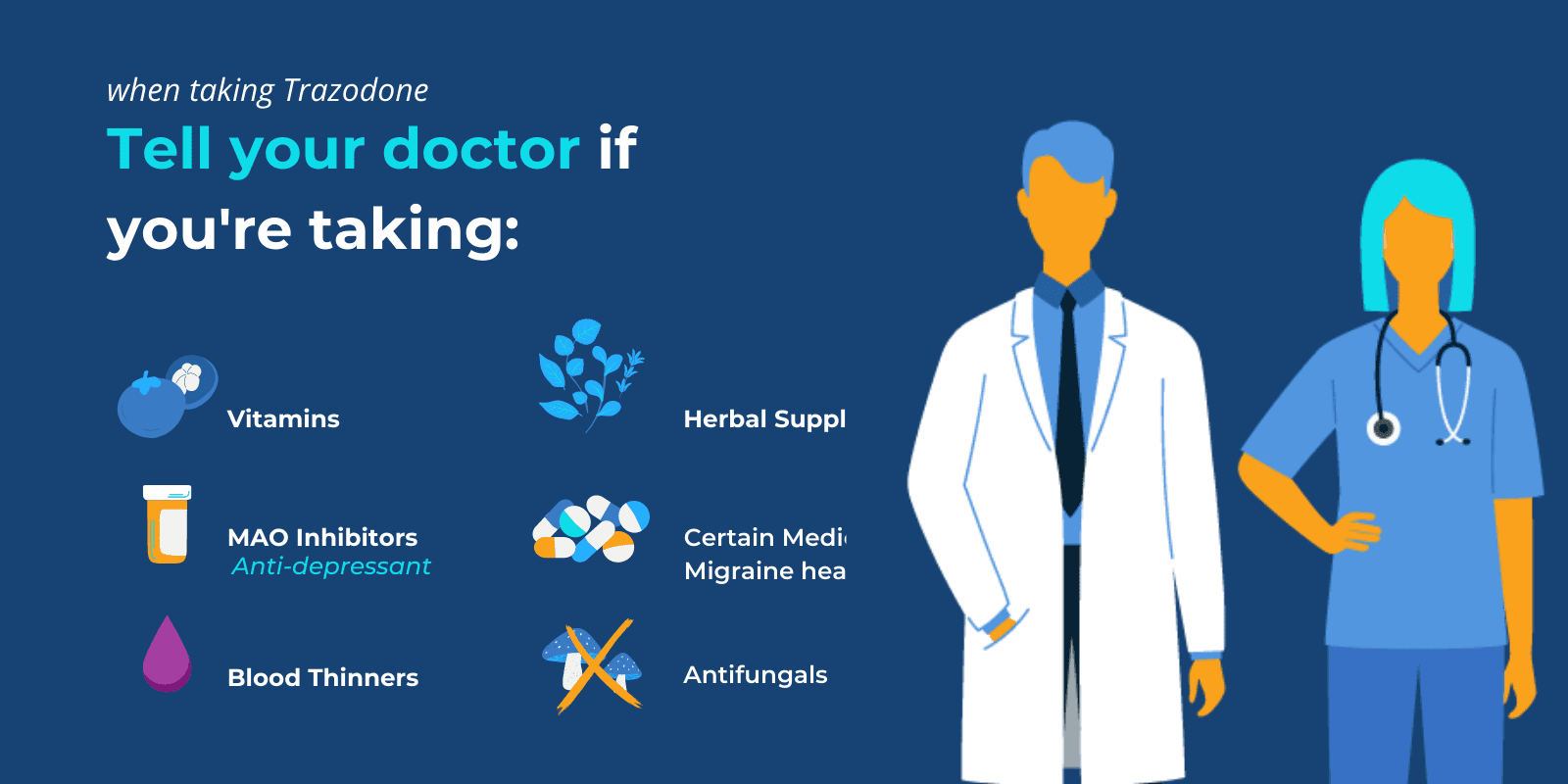
Important medications to mention include:
- Blood thinners
- Medications for mental illness
- Selective serotonin reuptake inhibitors
- Tricyclic antidepressants
- Antifungals
- Medications for migraines
A person should also take caution before driving if taking trazodone, as its effects can cause impairment. Don’t drive or operate machinery until you know how this medication affects you and after consulting with a doctor.
Trazodone Side Effects
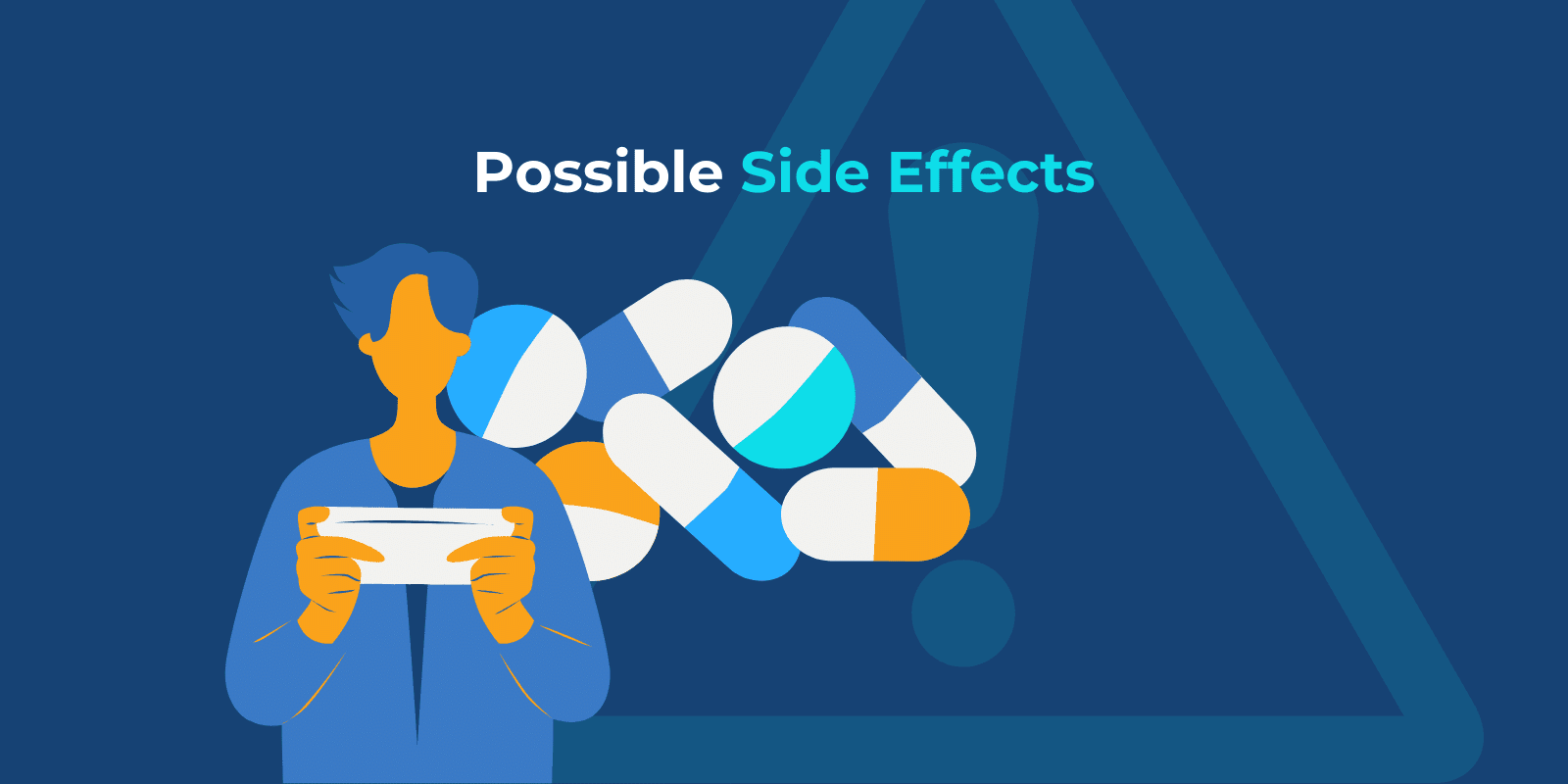
What Are the Side Effects of Trazodone?
Side effects of trazodone can include:
- Blurred vision
- Nausea and vomiting
- Diarrhea or constipation
- Changes in appetite
- Weight changes
- Feeling weak or tired
- Nervousness
- Dizziness
- Lightheadedness
- Nightmares
- Muscle pain
- Dry mouth
- Rash
- Stuffy nose
- Red or itchy eyes
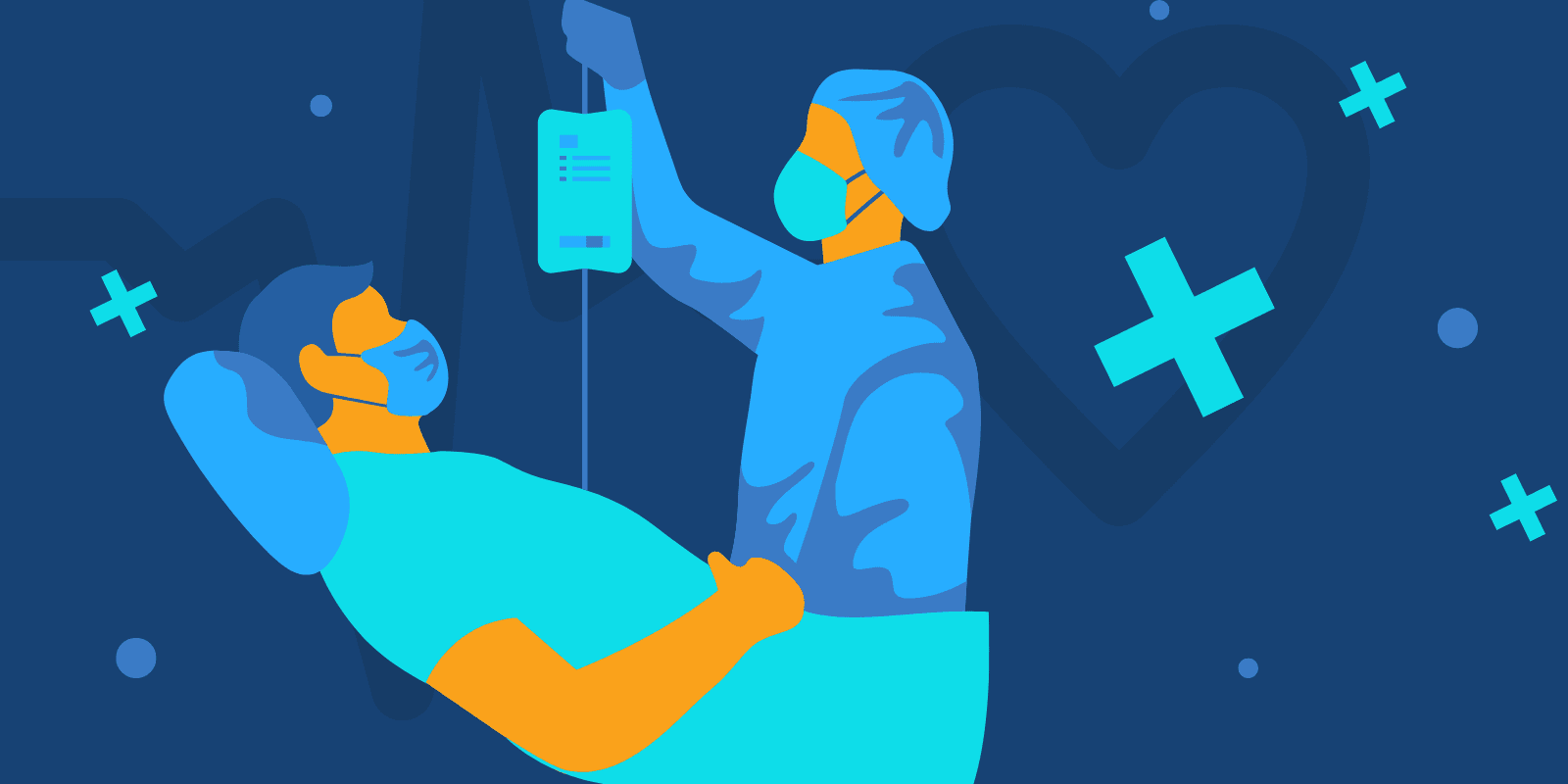
Serious side effects of trazodone can include:
- Chest pain
- Changes in heartbeat
- Loss of consciousness
- Fainting
- Fever
- Shortness of breath
- Unusual bleeding or bruising
- Headaches
- Problems thinking or concentration
- Trouble with memory
- Lack of coordination
Antidepressants like trazodone can also increase the risk of a person experiencing suicidal thoughts, especially in adolescents, children, and young adults.
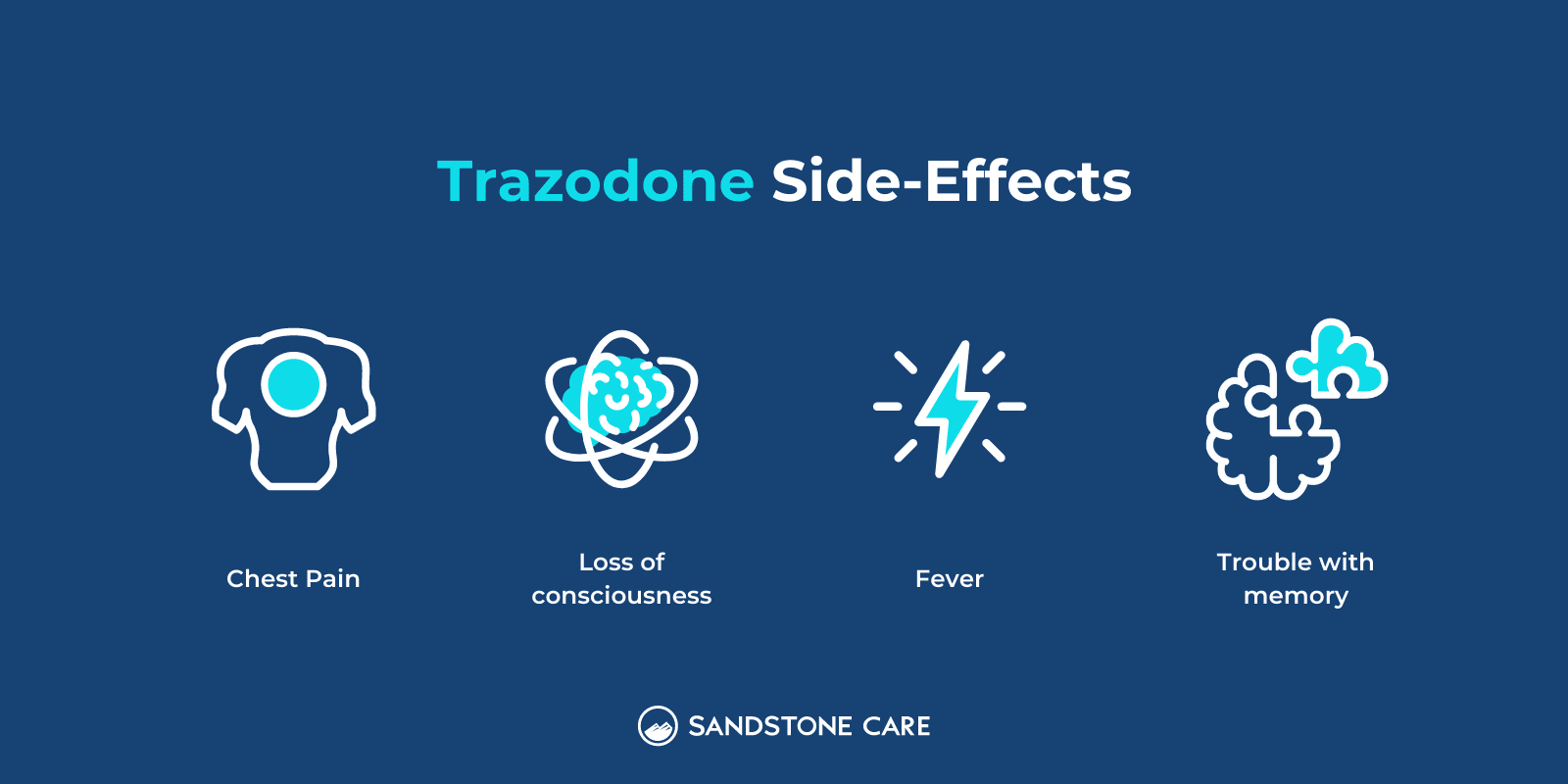
In rare cases, trazodone use can cause serotonin syndrome, a potentially life-threatening condition where a person’s serotonin levels are too high, causing them to experience both mental and physical symptoms.
If you or a loved one are experiencing suicidal thoughts, seek help. Call 911 or the national suicide prevention lifeline at 988. You are not alone, and there is help for you.
Trazodone may also cause a condition called angle-closure glaucoma, where the fluid in the eye causes a severe increase in pressure and can lead to vision loss.
Any individual who uses antidepressants for longer than 8 weeks faces the risk of developing a physical dependence on the drug, meaning that they can face withdrawal symptoms if they suddenly stop using the drug or significantly decrease their use.
What Is the Most Likely Side Effect of Trazodone?
The most common side effects of trazodone include drowsiness, dizziness, and nausea.
Can Trazodone Worsen Anxiety?
When a person first starts trazodone, they may feel that their depression or anxiety is worse because their body is adjusting to the new change.
Usually, in this case, the person tends to feel better after the first few weeks.
However, adverse effects of trazodone can include anxiety or depression.

Is this blog hitting close to home?
We’re here to help.
Does Trazodone Cause Weight Gain?
Yes, trazodone can cause both changes in appetite and weight.
It can make a person more hungry and cause them to eat more and gain weight.
Is Trazodone Hard On Your Heart?
Trazodone could negatively affect a person’s heart.
It can cause a condition known as QT prolongation, which can involve a fast or irregular heartbeat and other potentially serious symptoms.
However, according to Psychopathology, trazodone has been shown to have little effect on cardiac conduction and had shown to produce less postural hypotension than other antidepressants and actually lowers heart rate.
Additionally, trazodone is not usually recommended for those who have suffered a heart attack at any point in their life.
Does Trazodone Affect Your Thinking?
Trazodone may affect a person’s thinking, concentration, and memory, according to MedlinePlus.
Is Trazodone Harmful Long-term?
Trazodone is commonly taken as a long-term prescribed medication and is not considered harmful.
When used as prescribed, trazodone is considered generally safe. However, when misused, trazodone can harm both the brain and body.
Any person who takes antidepressants long-term, whether prescribed or not, has a risk of developing physical dependence.
In this case, the person should seek help from their doctor so they can safely manage their symptoms and reduce the risk of serious effects.
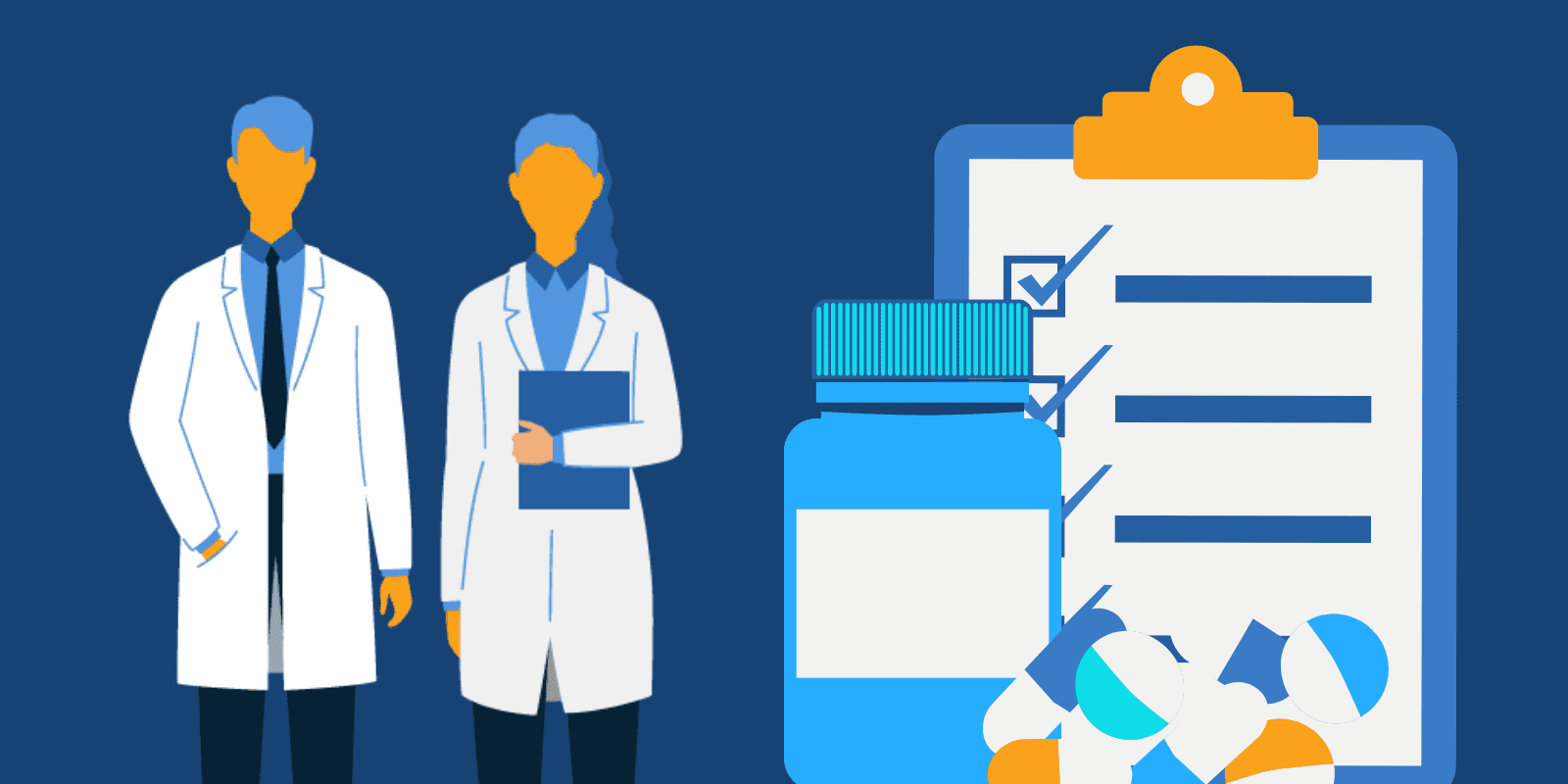
Trazodone Withdrawal & Treatment
What Mental Illness Does Trazodone Treat?
Trazodone is mostly used to treat depression, specifically major depressive disorder.
Trazodone is also sometimes used as an off-label treatment for anxiety.
Does Trazodone Deplete Dopamine?
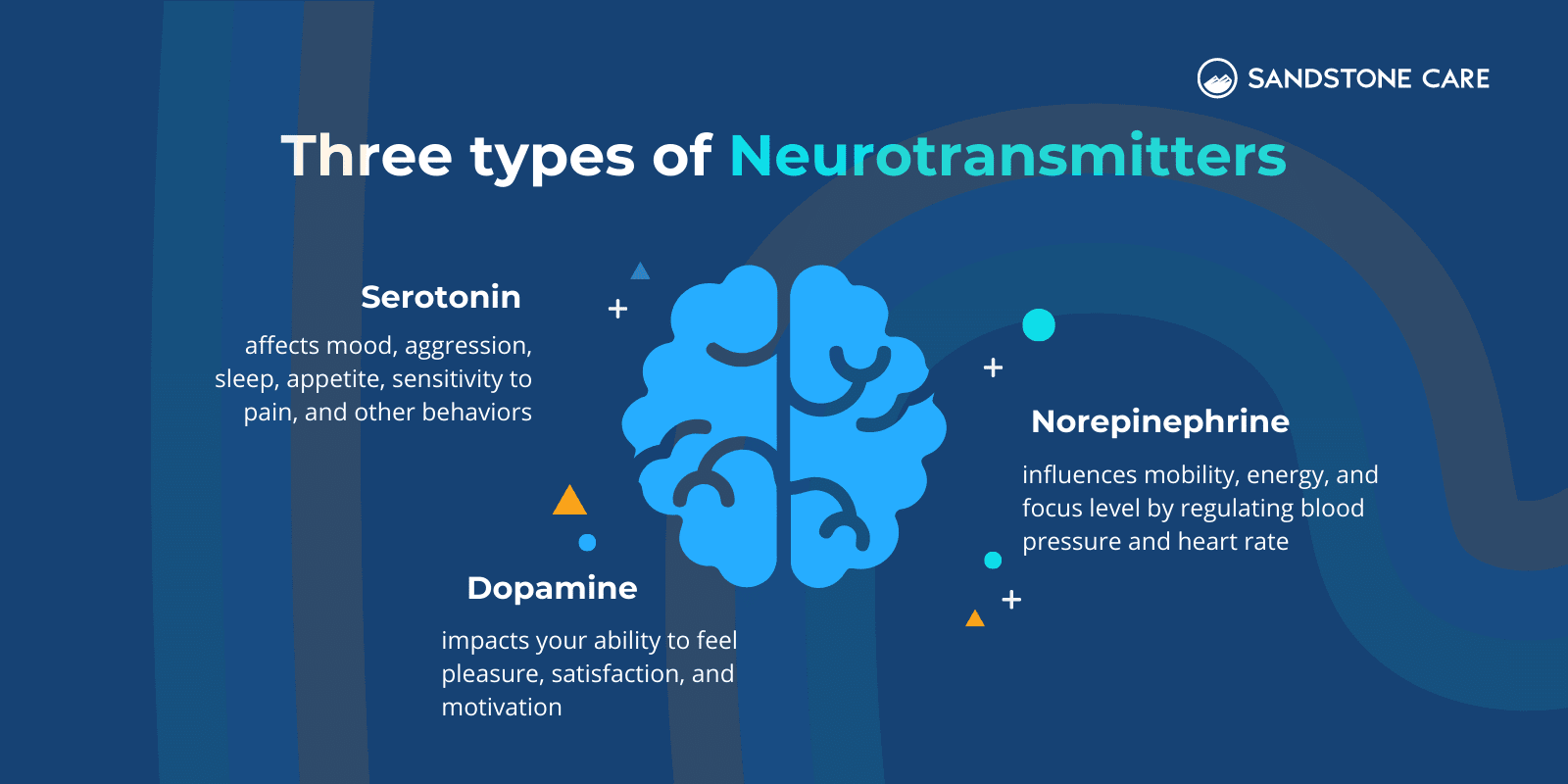
Are There Symptoms From Stopping Trazodone Abruptly?
Yes. Trazodone should not be stopped abruptly, especially without medical consultation.
Withdrawal symptoms of trazodone can include:
- Dizziness
- Nausea and vomiting
- Irritability
- Headaches
- Trouble concentrating
It is important to always let your healthcare provider know if you plan on stopping taking medication so that they can provide you with safety, advice, and supervision if needed.
Trazodone should be tapered, meaning the daily dose should slowly decrease with the end goal of completely discontinuing the medication to reduce the risk of withdrawal symptoms.
How Long Does It Take Trazodone to Wear Off?
For most people, trazodone can take around 1 to 2 days to fully wear off, depending on factors like dosage, metabolism, and overall health.
The sedative effects, which help with sleep, typically wear off within 6 to 10 hours, which is why it’s often prescribed as a nighttime medication.
However, some individuals may experience lingering drowsiness or grogginess the next day, especially if they are taking higher doses or have a slower metabolism.
What is the Half-Life of Trazodone?
The half-life of trazodone is about 5 to 9 hours, meaning that it takes this amount of time for half of the drug to be eliminated from the body.
However, it usually takes several half-lives for the drug to be completely cleared.
How Long Does Trazodone Stay in Your System?
It typically does not take more than three days for the vast majority of Trazodone to leave your system.
Trazodone leaves the body primarily through the liver, where it is metabolized into inactive compounds.
For most people, traces of trazodone can be detected in urine for up to 3 days after the last dose, while it may remain detectable in blood for up to 24 hours.
In hair tests, it can be detected for a longer period, typically up to 90 days.
What Are Trazodone Withdrawal Symptoms?
Withdrawal symptoms from stopping trazodone may include:
- Anxiety
- Insomnia
- Fatigue
- Flu-like symptoms
- Suicidal thoughts
Though trazodone is not considered highly addictive, discontinuing it without gradually tapering the dose can cause discomfort.
Trazodone withdrawal symptoms happen because the body needs time to adjust when the medication is stopped. Trazodone affects brain chemicals, especially serotonin, which helps control mood, sleep, and anxiety.
When someone stops taking it suddenly, the brain has to get used to working without it, which can cause symptoms like anxiety, irritability, and mood swings.
Sleep problems, like insomnia or vivid dreams, occur because the body is no longer getting trazodone’s help with sleep.
Physical symptoms like nausea, dizziness, and headaches come from the body adjusting to the loss of the medication’s effects.
Gradually reducing the dose helps the body adapt more smoothly and can prevent or reduce these symptoms.
If you or a loved one are experiencing suicidal thoughts, call 911 or the national suicide prevention lifeline at 988.
If you are experiencing withdrawal symptoms, seek medical help and call your doctor so they can give you professional guidance to help you safely manage withdrawal symptoms.
Can Trazodone Cause Permanent Damage?
Trazodone is generally safe when used as prescribed and is not known to cause permanent damage for most people.
However, in rare cases or when misused, there could be potential risks.
Long-term misuse of trazodone might affect liver function in some individuals, especially those with preexisting conditions.
In addition, trazodone can sometimes affect heart rhythm, and in rare cases, it may cause or worsen irregular heartbeats, particularly in those with heart conditions.
Most of the side effects, such as memory lapses or the impacts of serotonin syndrome, are reversible with medical assistance.


Let’s take the next steps together
Trazodone is an antidepressant used to treat depressive disorders. Trazodone has the potential to be misused and may come with serious negative effects. Sandstone Care is here to support teens and young adults with mental health and substance use disorders.


